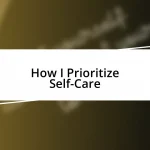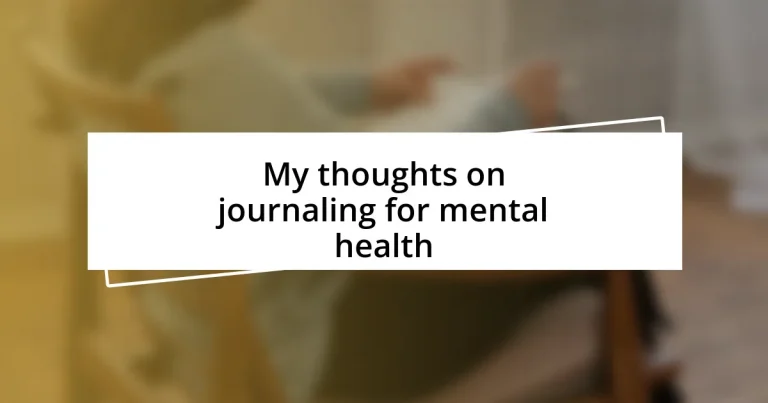Key takeaways:
- Journaling fosters self-discovery and emotional clarity by transforming chaos into insight.
- Effective techniques include setting a specific time for writing, using prompts, and practicing free writing for deeper emotional exploration.
- Choosing the right journal format, such as bullet journals or gratitude journals, enhances engagement and personal expression.
- Overcoming barriers like fear of judgment and the pressure for perfection is crucial for maintaining a consistent journaling practice.
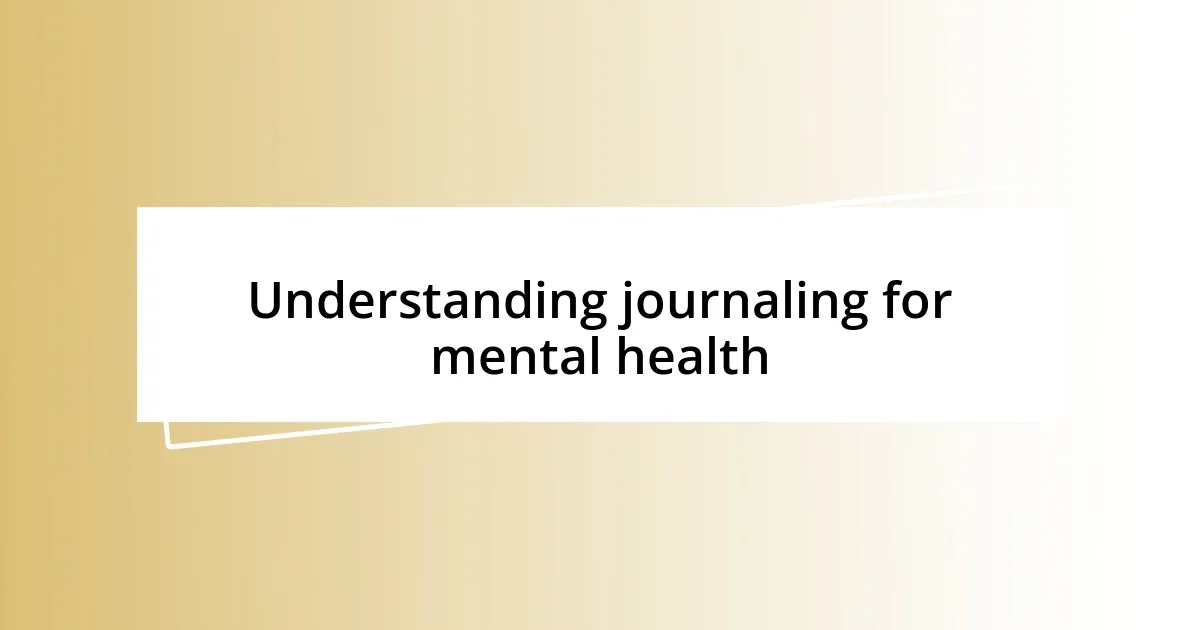
Understanding journaling for mental health
Journaling for mental health is more than just writing; it’s an intimate dialogue with oneself. When I first started journaling, I expected it to be a simple task, but I quickly realized it opened pathways to understand my emotions better. Have you ever experienced a flood of thoughts and felt overwhelmed? Putting pen to paper can help untangle that mess and bring clarity.
As I developed this practice, I discovered it served as a mirror reflecting my thoughts and feelings. One night, I poured my heart out about a particularly stressful day, and when I reread it, I was taken aback by how beautifully the act of writing transformed chaos into insight. It makes me wonder: how often do we take the time to reflect on our feelings outside of our busy lives?
It’s fascinating how a few minutes of journaling can create space for self-compassion and growth. I often find myself revisiting old entries, and it’s incredible how much I’ve evolved over time. There’s this undeniable sense of release—like shedding a weight—and that’s what makes journaling such a powerful tool for mental health. Isn’t it amazing how something so simple can lead to profound self-discovery?
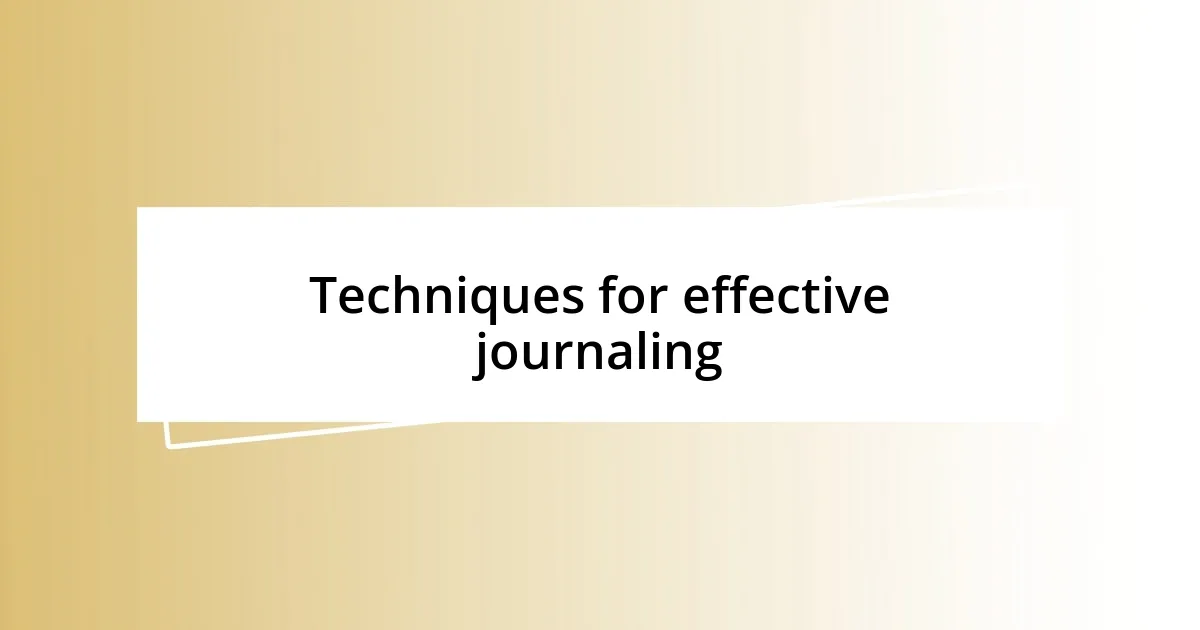
Techniques for effective journaling
One of the most effective techniques for journaling is setting a specific time each day to write. I’ve learned that consistency helps create a sacred routine, making it easier to clear my mind. For instance, I often journal in the morning with a steaming cup of tea beside me, which has become a comforting ritual. This not only prepares me mentally for the day ahead but also establishes a sanctuary for my thoughts.
Another technique I swear by is using prompts. Whenever I find myself staring at a blank page, I turn to prompts that spark my creativity. For example, asking myself, “What am I grateful for today?” often leads to unexpected reflections. This kind of questioning transforms the writing task from daunting to energizing, and it’s amazing how a simple prompt can uncover layers of emotion I wasn’t consciously aware of.
Finally, I advocate for free writing, where I let my thoughts flow without judgment or concern for grammar. This approach allows me to capture pure emotions and insights, often leading to breakthroughs. I remember a day when I wrote furiously about my fears; by the end, I was surprised at how much lighter I felt. It’s moments like these that remind me of the power of words in processing and healing my mental state.
| Technique | Description |
|---|---|
| Set a Specific Time | Establishes a routine, creating a comforting space for reflection daily. |
| Use Prompts | Sparks creativity and drives deeper emotional exploration, turning blank pages into narratives. |
| Practice Free Writing | Encourages unfiltered expression of thoughts and emotions, often leading to personal breakthroughs. |
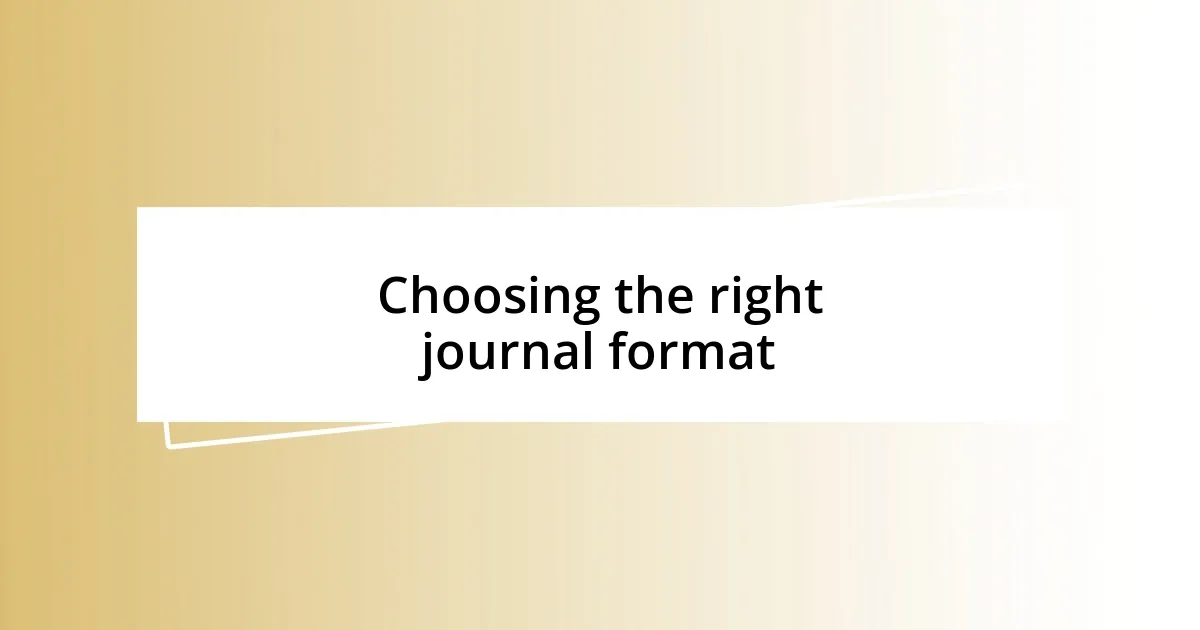
Choosing the right journal format
Choosing the right journaling format can significantly impact your experience. When I first tried journaling, I gravitated towards a traditional lined notebook, but I quickly realized that structure wasn’t what I needed. Experimenting with various formats was eye-opening; it revealed different aspects of my emotional journey. I’ve enjoyed using bullet journals, which not only help me track my mood but also allow for creativity through doodles or specific layouts. It’s fascinating how the right format can motivate you to engage regularly.
Here are some formats to consider:
- Lined notebooks: Great for structured writing; ideal for those who want a classic approach to journaling.
- Bullet journals: Combine notes, lists, and creative elements, offering flexibility that encourages personal expression.
- Gratitude journals: Focus on positive reflections, helping shift your mindset and enhance emotional well-being.
- Digital journals: Convenient for tech-savvy individuals, allowing for quick entries and accessibility across devices.
- Sketchbooks: Perfect for visual thinkers; they promote drawing and visual representation of emotions alongside words.
By exploring these options, you might just find one that resonates with you, making your journaling practice all the more fulfilling.
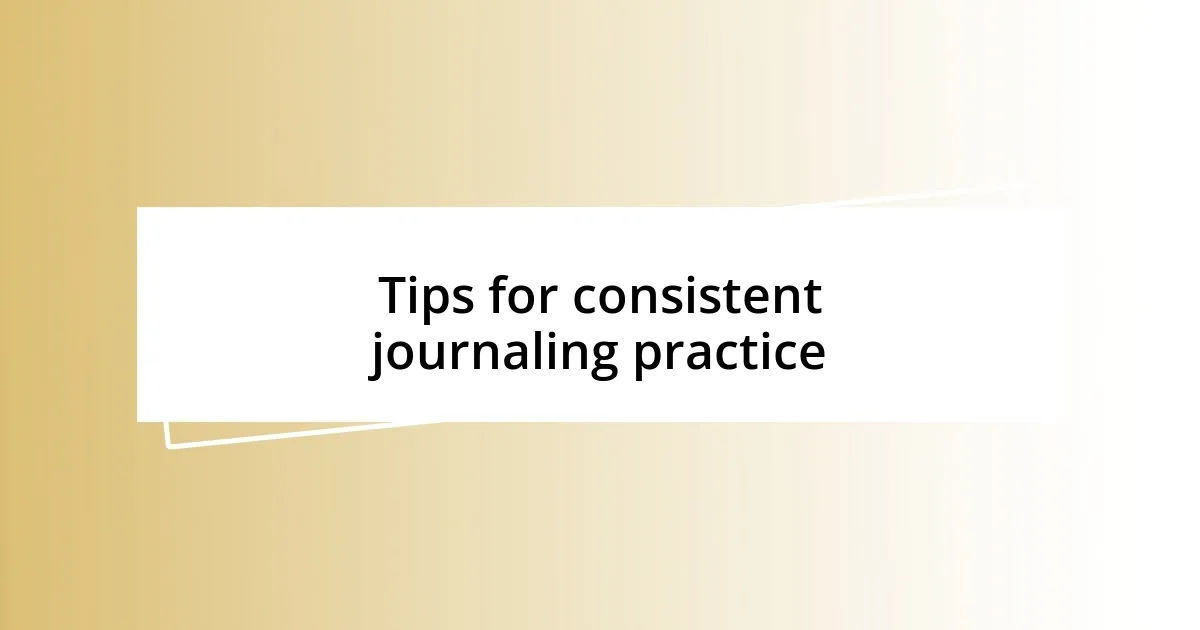
Tips for consistent journaling practice
One of the best tips for maintaining a consistent journaling practice is to keep your journal within reach. I’ve found that having it by my bedside or in my bag makes it so much easier to jot down thoughts whenever they arise. How often have you had a great idea or feeling but forgot it because you weren’t in the right place to write? Keeping your journal handy ensures those fleeting moments of inspiration are captured before they slip away.
Another essential tip is to set achievable goals. Instead of aiming for a perfect entry every day, I often remind myself that even a few sentences can be powerful. On days when I feel overwhelmed, I aim for just one line—something simple like “Today was challenging, but I learned…” This small effort makes it less daunting and reinforces the habit without the pressure to perform perfectly.
Lastly, I can’t stress enough the value of reflection. Once a week, I take time to read back through my entries, and it’s stunning to see how much I’ve grown or what patterns emerge. Have you ever revisited your past thoughts and realized how far you’ve come? This practice not only motivates me to keep writing but also enhances my understanding of my emotional journey, making each entry feel like a piece of a larger puzzle.
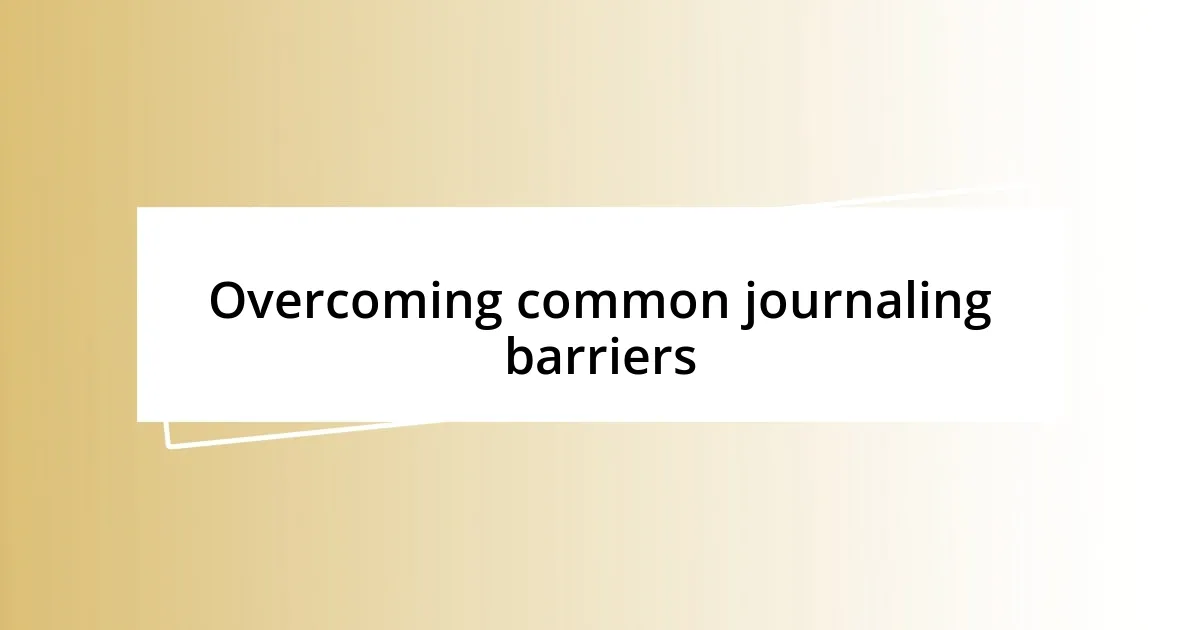
Overcoming common journaling barriers
One major barrier to journaling is the fear of judgment, even if it’s just self-judgment. I remember feeling that my thoughts weren’t worthy enough to be written down. To overcome this, I started reminding myself that my journal is a safe space for my feelings, free from any external critique. After all, who better to express my thoughts than me? Embracing this idea made it easier to let go and just write.
Another common hurdle is the daunting expectation of writing consistently. There was a time when I felt pressured to fill entire pages each day. Gradually, I learned that journaling doesn’t have to be a lengthy affair. Sometimes, just a few lines about my day or my feelings were enough. By shifting my focus from quantity to authenticity, I could capture genuine moments without feeling overwhelmed.
Lastly, the misconception that journaling has to be a formal, polished process can deter many from starting. I often found myself thinking my entries needed to follow a strict format, which stifled my creativity. However, I discovered that even doodles or random thoughts can be deeply meaningful. Have you ever jotted down a fleeting idea and later realized its importance? Embracing spontaneity not only nurtures creativity but also enriches the emotional depth of my journaling experience.
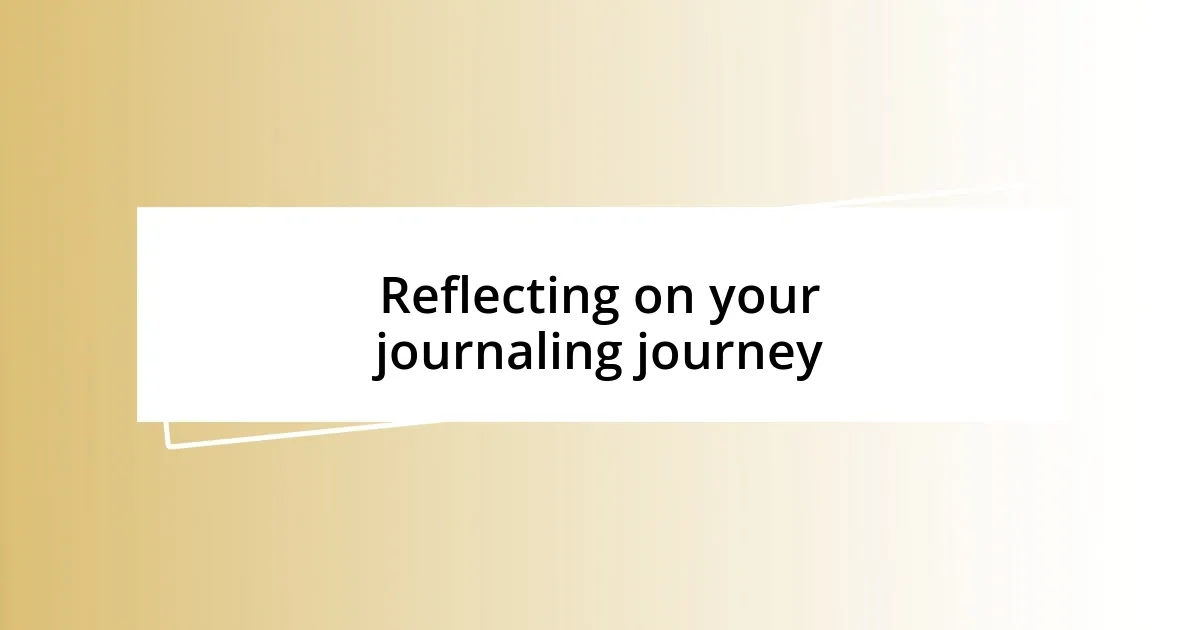
Reflecting on your journaling journey
Reflecting on my journaling journey has been a transformative experience. I recall a moment when I flipped back through my entries from a particularly challenging year. The words jumped at me—raw, honest, and sometimes messy—but they showcased my resilience. Have you ever looked back and felt a wave of pride for simply persevering? That realization of who I’ve become through ups and downs has been cathartic.
Taking time to reflect on my journaling often reveals surprising insights. Sometimes, I discover recurring themes in my thoughts that I hadn’t noticed while writing. For instance, during one reflection session, I stumbled upon countless entries about feeling lost and confused, which illuminated the fact that I was desperately seeking clarity. This revelation prompted me to shift my focus in future entries, guiding me toward deeper self-discovery.
In those reflective moments, I also enjoy considering how much my emotional vocabulary has expanded. Initially, my entries felt like a simple checklist of emotions. Now, I’m able to articulate my feelings with greater nuance. Have you ever felt the satisfaction of finding just the right words to describe how you feel? For me, this growth in expression has not only shaped my journaling but has also significantly impacted how I communicate with others in my life.









